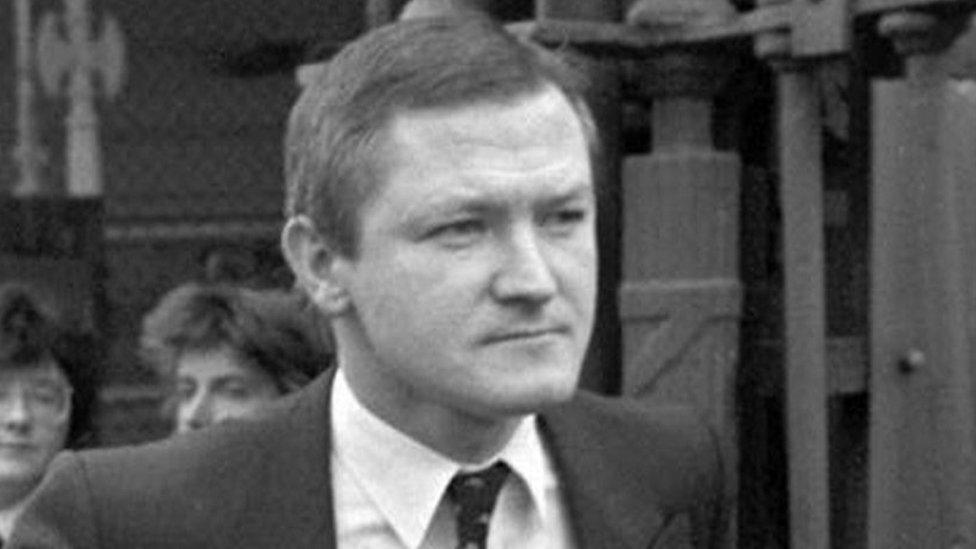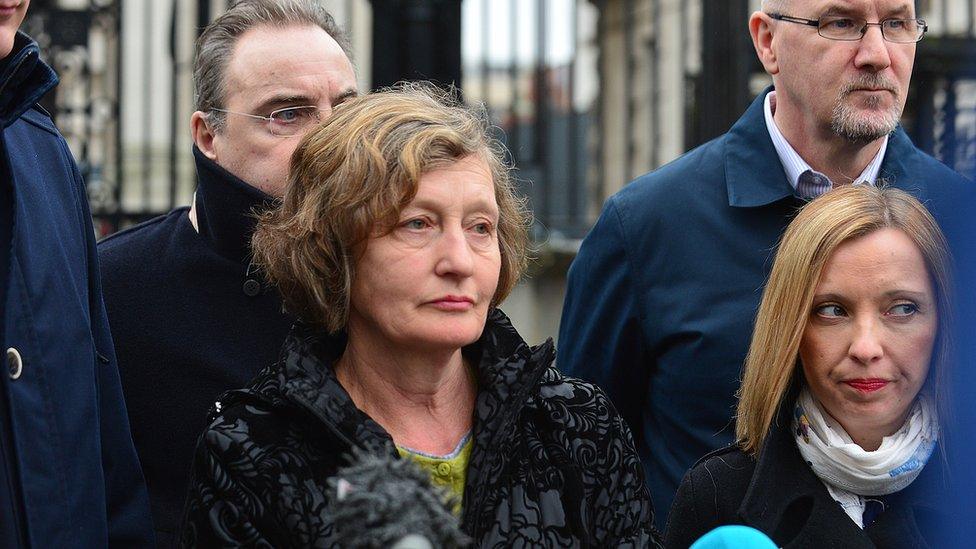Decision on Pat Finucane inquiry 'by end of November'
- Published

Pat Finucane, a 39-year-old Belfast solicitor, was shot dead in front of his wife and children in 1989
The NI secretary has pledged to make a decision on whether to order a public inquiry into the 1989 murder of Pat Finucane by the end of November.
A lawyer for Brandon Lewis gave the commitment in a Belfast court.
He also apologised for the time taken to reach a final position - some of which could not be justified.
The move came in a case brought by Mr Finucane's widow over the government's delay in acting on a finding that his death was never properly investigated.
Geraldine Finucane's barrister described the ongoing hold-up as "shameful".
Mr Finucane was 39 when he was shot dead by loyalist paramilitaries in front of his wife and three children at their north Belfast home in February 1989.
He was a high-profile solicitor who lived and worked in Belfast and convicted members of the IRA were among his clients.
His family have campaigned ever since for a public inquiry to establish the full scale of security force collusion.
In February last year the Supreme Court held that previous probes into the murder did not meet human rights standards.
But the justices ruled out a public inquiry of the type demanded by the family and said it was for the state to decide "what form of investigation, if indeed any is now feasible, is required".
Mrs Finucane brought judicial review proceedings against the Northern Ireland secretary for failing to take a decision on the investigation required since that ruling.
Her legal team argued that the continuing delay is unjustified and an unlawful breach of human rights.
The judge hearing the case, Mr Justice McAlinden, also expressed his deep unease at how the government was dealing with a continued breach of international and domestic legal obligations.

Geraldine Finucane has been involved in a long-running legal battle
As proceedings resumed today, Paul McLaughlin QC, for the Northern Ireland secretary, said he was instructed to offer a commitment to reach a decision on or before 30 November - in time for a meeting of the Council of Europe's Committee of Ministers in December.
Mr McLaughlin acknowledged some of the periods of time taken to reach a decision are not justifiable.
He added that the NI secretary wanted to indicate he is sorry it has taken so long to reach a final decision in the case.

What is a public inquiry and why are they held?
Public inquiries are set up to uncover the truth following scandals or perceived injustices.
The test that must be satisfied in order to hold an inquiry is that it is of "public concern". , external
While often chaired by a judge, a public inquiry is not a court of law and cannot determine liability.
The aim is that public inquiries are independent.
The government decides whether to hold an inquiry in the first place, appoints its head, and has to agree what it is going to cover.
Inquiries can then make recommendations about how things should change but governments do not have to accept them.
An example of a public inquiry is the inquiry into the GP and serial killer Harold Shipman, chaired by Dame Janet Smith - a High Court judge.

Fiona Doherty QC, representing Mrs Finucane, said: "It is shameful that, 30 years after Mr Finucane's murder, it has taken 20 months or more for the government to react to the Supreme Court's decision.
"In our respectful submission an apology is the least that the secretary of state owes Mrs Finucane."
However, Mr Justice McAlinden welcomed the approach now being taken.
"I think it is important that central government behaves in an appropriate manner, and the acknowledgment and the offering of an apology is a highly appropriate response at this stage," he said.
The judge agreed to adjourn the case, with a further review listed in December.
Outside court Mrs Finucane's solicitor, Peter Madden of Madden & Finucane, said: "It is unfortunate that we have had to resort to extensive litigation over the last three decades in order to protect and vindicate Geraldine Finucane's rights.
"We expect that the secretary of state will now take the only legitimate course available to him and announce a full public judicial inquiry and that we will not need to resort to further court proceedings."
- Published27 February 2019
